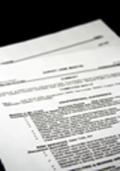
Do: Use numbers where appropriate to clearly describe your accomplishments.
Don't: Use vague qualitative terms such as "large" or "many," which leave the reader with questions about specifics.
Do: Distinguish the important from the trivial in your background to fit the most relevant and significant elements onto a single page or so.
Don't: Waste resume space with frivolous information, such as "Voted mostly likely to succeed in high school."
Do: Stick to a basic, clear format that helps the reader glean information quickly and with minimal effort.
Don't: Try to differentiate yourself with an unconventional format or tactics such as graphics and colored paper, unless you are applying for jobs in arts-related fields.
Do: Make your resume a document that focuses on your accomplishments and skills.
Don't: Include reasons for leaving your jobs, salary information, or references on your resume.
Do: Discuss your two or three most relevant strengths and illustrate them with experience and achievement statements.
Don't: Try to portray yourself as a jack-of-all-trades in the hope that something will strike the reader's fancy.
Do: Use the active voice with verbs that indicate you're in charge: "Represented firm at international symposium."
Don't: Get caught in the passive voice trap, writing as if things happened to you. "Was sent to Argentina to represent the firm..."
Do: Begin each achievement statement with an active verb: "Handled all client correspondence."
Don't: Refer to yourself as a subject (first or third person) in your resume: "I helped prepare correspondence," or, "Applicant wrote outreach letters to prospective clients."
Do: Present yourself as a professional, with a straightforward email account and, if applicable, a website that showcases relevant skills and achievements.
Don't: Include email addresses or websites that have the potential to reveal controversial or inappropriate personal information: Avoid addresses such as sxybb@imacutiepie.com or queenoftheraccoons@hotmail.com.
Do: Be aware that employers are interested in your eligibility to work legally and may ask for documentation. Take the time to learn about your rights and responsibilities in the workplace.
Don't: Include personal information such as social security number, age, race, or marital status on your resume (unless you're writing an international CV).
Do: Use your current home address, a personal email address, and telephone number with a professional outgoing message. Be sure that prospective employers can easily reach you; check your messages regularly.
Don't: Use your current work email or phone number as contact information. This indicates that you are job searching on your employer's time, something no prospective employer will view positively.



